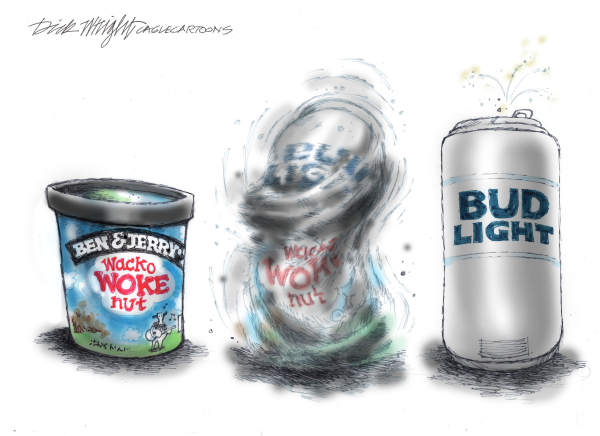
Ben & Jerry's Ice Cream wants the United States to return the Blacks Hills to the Lakota.
Which raises the question: Once this transfer takes place, will the Lakota turn around and give the Black Hills back to the tribes they took them from?
It's never a good idea to get history lessons from an ice-cream maker with a hippy vibe that sold out to a multinational conglomerate long ago, but the Ben & Jerry's July 4th condemnation of the United States as "founded on stolen Indigenous land" is a common enough hostile interpretation of our past that it's worth dwelling on.
There is no doubt that our dealings with Native Americans were characterized by brutality, land-hunger and duplicity, and constitute one of the nation's foremost sins.
The problem with the Ben & Jerry's view, which is considered a truism on the left, is that it is immune to complexity and rests on an ahistorical, ultimately condescending belief in the inherent innocence and peaceableness of Native Americans.
Consider the Lakota.
Like many other tribes we encountered on the Plains, they were relative newcomers to the area, getting pushed westward and establishing themselves on the Plains by intra-tribal warfare.
Counter to the saccharine romance of such depictions as the famous Kevin Costner movie, "Dances with Wolves," Native American society was red in tooth and claw; Native Americans weren't simplistic archetypes, but real people prone to all the usual flaws of human nature including hatred, greed and violence.
The Ben & Jerry's July 4th message refers to the Lakota "fighting to keep colonizers off their land," without any mention of the fact that just a short time before they were the colonizers.
As Elliott West notes in his new book "Continental Reckoning: The American West in the Age of Expansion," the advent of a horse culture among various Native American tribes made the Great Plains and Southwest a killing field of warfare and disease.
"Two great coalitions — Cheyennes, Arapahos, and Lakotas north of the Arkansas River and Comanches and Kiowas south of it — clashed bitterly until making peace in 1840, then both preyed on sedentary peoples on the fringes," West writes.
Devastating smallpox epidemics, slaughters and raids and counter-raids were dismayingly routine features of these regions long before the United States was a contender for dominance.
According to West, one reason so much Mexican land was there for the taking during the Mexican-American War was it had been depopulated by constant Native American raiding.
Is it too much for Ben & Jerry's to spare a thought for the Mexicans killed, captured or dispossessed by merciless Native American warriors?
As for the Lakota, they didn't take control of territory to the west through gentle persuasion.
They gained control of the Black Hills in the late 18th century by expelling the prior occupants.
The history here doesn't neatly line up with the Ben & Jerry's call for "dismantling white supremacy and systems of oppression and ensuring that Indigenous people can again govern the land their communities called home for thousands of years."
Which indigenous people?
And which lands?
None of this is to minimize the double-dealing that saw the United States take the Black Hills after the discovery of gold, or the demographic catastrophe that befell native peoples.
Europeans unleashed terrible epidemics when they came to these shores, although that wasn't something they foresaw or intended.
The potted version of the nation's history favored by the likes of Ben & Jerry's is meant to delegitimize the United States as such.
Not only does it make the country's expansion a tale of unadulterated malevolence, it can't accommodate the reality of Native American peoples who practiced self-interested, ever-shifting diplomacy with one another and Europeans, and constantly warred with one another as well as with Europeans — for land and hunting grounds, for honor and vengeance and for captives to add to their numbers.
Suffice it to say that — no matter what their latter-day champions might wish — these peoples were not politically correct.
(COMMENT, BELOW)

